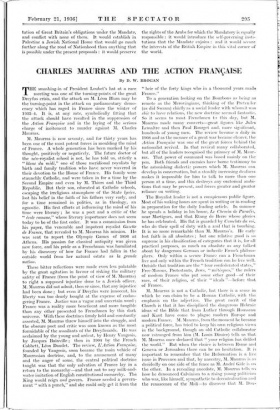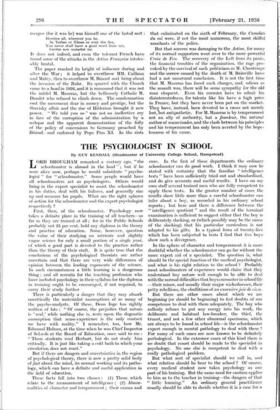CHARLES MAURRAS AND THE ACTION TRANcAISE
By D. W. BROGAN
THE smashing-in of President Loubet's hat at a race meeting was one of the turning-points of the great Dreyfus crisis, and the attack on M. Leon Blum may be the turning-point in the attack on parliamentary demo- cracy which has raged in France since the winter of 1933-4. It is, at any rate, symbolically fitting that the attack should have resulted in the suppression of the Action Francaise and in the laying of the serious charge of incitement to murder against M. Charles Maurras.
M. Maurras is now seventy, and for thirty years has been one of the most potent forces in moulding the mind of France. A whole generation has been marked by his thought, positively or negatively. The future doctor of the neo-royalist school is not, he has told us, strictly a " blane du midi," one of those meridional royalists by birth and family tradition who have never wavered in their devotion to the House of France. His family were staunchly Catholic, and were taken in for a time by the Second Empire and even by M. Thicrs and the Third Republic. But their son, educated at Catholic schools, escaping the irreligious atmosphere of the. State lycees, lost his belief in the faith of his fathers very early, and for a time remained in politics, as in theology, an agnostic. His first efforts at influencing the mind of his time were literary ; he was a poet and a critic of the " ecole romane," whose literary importance does not seem today to be of the first order. It was a commission from his paper, the venerable and impotent royalist Gazette de France, that revealed to M. Maurras his mission. He was sent to report the Olympic Games of 1896 at Athens. His passion for classical antiquity was given new force, and his pride as a Frenchman was humiliated by his discovery of how far France had fallen in the outside world from her natural estate as la grande nation: These bitter reflections were made even less palatable by the great agitation in favour of risking the military safety of France (from the point of view of M. Maurras) to right a supposed injustice done to a Jewish officer. M. Maurras did not admit, then or since, that any injustice had been done ; but even if Dreyfus were innocent, his liberty was too dearly bought at the expense of endan- gering France. Justice was a vague and uncertain word ; France was a reality more beneficent and more tangible than any other' presented to Frenchmen by this dark universe." With these doctrines firmly held and constantly asserted, M. Maurras threw himself into the struggle, and the obscure poet and critic was soon known as the most formidable of the assailants of the Dreyfusards. He was acclaimed by the young and ardent, by Henry Vaugeois, by Jacques Bainville ; then in 1904' by the French Cobbett,' Leon Daudet. The review, L'Action Francaise, founded by Vaugeois, soon became the main vehicle of Maurrasian doctrine, and, to the amusement of many and the anger of some, the central political doctrine taught was that the 'only salvation of France lay in a return to the monarchy—and that not to any milk-and- water imitation of English constitutional monarchy. The King would reign and govern. France needed a govern- ment " with a punch," and she could only get it from the " heir of the forty kings who in a thousand years made France."
To a generation looking on the Bourbons as being as remote as the Mcrovingians, thinking of the Pretenier (as did Swann) chiefly as a social leader with whom it was chic to have relations, the new doctrine seemed fantastic. So it seems to most Frenchmen to this day, but M. Maurras made many converts—great figures like Jules Lemaitre and then Paul Bourget and, more significant, hundreds of young men. The review became a daily in 1908 and as the menace of a great war became clearer, the Action Franfaise was one of the great forces behind the nationalist revival. In that revival many collaborated, but all of the leaders recognised the primacy of M. Maur- ras. That power of command was based mainly on the pen. Both friends and enemies have borne testimony to the astonishing dialectic powers which M. Maurras can develop in conversation, but a steadily increasing deafness makes it impossible for him to talk to more than one person at a time, and this destroys any oratorical ambi- tions that may be present, and forces greater and greater reliance on writing.
The Royalist leader is not a conspicuous public figure. Most of his waking hours are spent in writing or in reading in preparation for the daily leading article. In summer he spends a holiday in his house, Le Chemin de Farad is, near Martigues, and that Etang de Berre whose glories he has celebrated. His flat is guarded by Ca;nclots du roi, who do their spell of duty with a zeal that is touching. It is no more remarkable than M. Maurras's. He early lost faith in all absolutes ; but one relative good is so supreme in his classification of categories that it is, for all practical purposes, as much an absolute as any talked about by dangerous German or imbecile French philoso- phers. Only within a secure France can a Frenchman live and only within the French tradition can he live well. Outside that tradition are the " four confederated states," Free-Masons, Protestants, Jews, " meteques," the rulers of modern France who put some other good—of their race, of their religion, of their " ideals "—before that of France.
M. Maurras is not a Catholic, but there is a sense in which he can claim to be a Roman Catholic, with the emphasis on the adjective. The great merit of the Church is that it has disciplined the dangerous Hebraic ideas' of the Bible that from Luther through Rousseau and Kant have come to plague modern Europe and modern France. M. Maurras, from the moment he became a political force, has tried to keep his own religious views in the background, though an old Catholic collaborator now 'estranged from him (M. Louis Dimier) tells us that M. Maurras once declared that " your religion has defiled the world." But when the choice is between Rome and Geneva or Jerusalem there can be no hesitation. It is important to remember that the Reformation is a live issue in Provence and that, by ancestry, M. Maurras is as decidedly on one side of the fence as M. Andre Gide is on the other. In a revealing anecdote, M. Maurras tells us how he denounced Calvinism to a rising young politician who was, like himself, sympathetic to decentralisation and the renascence of the Midi—to discover that M. Don.. mergue (for it was he) was himself one of the hated sect :
ihmeties all, wherever you be, In Tarbes or Nimes or over the Sea, You never shall have a good word from me,
Caritas non andurbcd me.
It does not indeed, and even the tolerant French have found some of the attacks in the Action Francoise intoler- ably brutal.
The paper reached its height of influence during and after the War ; it helped to overthrow MM. Caillaux and Malvy, then to overthrow H. Briand and bring about the invasion of the Ruhr. Its quarrel with the Church came to a head in 1926, and it is rumoured that it was not the infidel M. Maurras, but the bellicosely Catholic M. Daudet who refused to climb down. The condemnation cost the movement dear in money and prestige, but the Stavisky affair and the rise of Hitlerism brought it new power. " We told you so " was not an ineffective cry in face of the corruption of the administration by a Ineteque and the apparent demonstration of the folly of the policy of concessions to Germany preached by Briand—and endorsed by Pope Pius XI. In the riots that culminated on the sixth of February, the Cornekts du roi were, if not the most numerous, the most skilful assailants of the police.
But that success was damaging to the Action, for many of its normal supporters went over to the more powerful Croix de Feu. The recovery of the Left from its panic, the financial troubles of the organisation, the rage pro- voked by the survival of such politicians as M. Chautemps and the sorrow caused by the death of M. Bainville have had a not unnatural conclusion. It is not the first time that M. Maurras has faced such charges, and, odious as the assault was, there will be some sympathy for the old man eloquent. Even his enemies have to admit his disinterestedness, for talents like his have a high price in France, but they have never been put on the market. They have, instead, been devoted to a cause not merely lost;but antipathetic. For M. Maurras is by temperament not an ally of authority, but a ftondeur, the natural author of rnazarinades, and the clash between his principles and his temperament has only been averted by the hope- lessness of his cause.















































 Previous page
Previous page